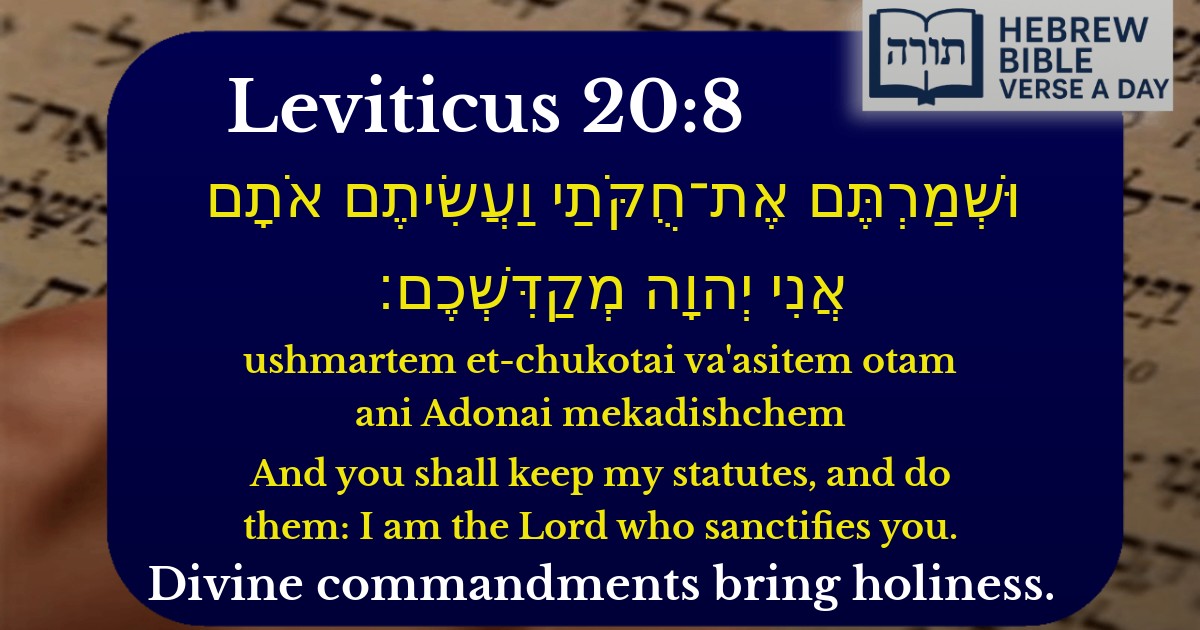Join Our Newsletter To Be Informed When New Videos Are Posted
Join the thousands of fellow Studends who rely on our videos to learn how to read the bible in Hebrew for free!
Hebrew Text
וּשְׁמַרְתֶּם אֶת־חֻקֹּתַי וַעֲשִׂיתֶם אֹתָם אֲנִי יְהוָה מְקַדִּשְׁכֶם׃
English Translation
And you shall keep my statutes, and do them: I am the Lord who sanctifies you.
Transliteration
Ushmartem et-chukotai va'asitem otam ani Adonai mekadishchem
Hebrew Leining Text
וּשְׁמַרְתֶּם֙ אֶת־חֻקֹּתַ֔י וַעֲשִׂיתֶ֖ם אֹתָ֑ם אֲנִ֥י יְהֹוָ֖ה מְקַדִּשְׁכֶֽם׃
וּשְׁמַרְתֶּם֙ אֶת־חֻקֹּתַ֔י וַעֲשִׂיתֶ֖ם אֹתָ֑ם אֲנִ֥י יְהֹוָ֖ה מְקַדִּשְׁכֶֽם׃
🎵 Listen to leining
Parasha Commentary
📚 Talmud Citations
This verse is quoted in the Talmud.
📖 Yoma 39a
The verse is referenced in a discussion about the sanctity of the commandments and the role of God in sanctifying the Jewish people.
📖 Sanhedrin 56b
The verse is cited in the context of the Noahide laws and the broader discussion of divine commandments.


Understanding the Verse
The verse "וּשְׁמַרְתֶּם אֶת־חֻקֹּתַי וַעֲשִׂיתֶם אֹתָם אֲנִי יְהוָה מְקַדִּשְׁכֶם" (Vayikra 20:8) emphasizes the dual obligation to guard (שְׁמִירָה) and perform (עֲשִׂיָּה) Hashem's statutes, with the concluding affirmation that He sanctifies us.
Rashi's Commentary
Rashi explains that "וּשְׁמַרְתֶּם" refers to studying and internalizing the mitzvot to ensure their proper performance, while "וַעֲשִׂיתֶם" is the actual fulfillment. This aligns with the Talmudic principle (Kiddushin 40b) that study leads to action. The phrase "אֲנִי יְהוָה מְקַדִּשְׁכֶם" teaches that sanctification comes through adherence to mitzvot, as Hashem designates us as holy when we follow His will.
Rambam's Perspective
In Mishneh Torah (Hilchot Yesodei HaTorah 1:1), Rambam highlights that the foundation of holiness is recognizing Hashem as the source of all sanctity. By observing חֻקִּים (statutes)—even those beyond human comprehension—we affirm our devotion to His wisdom, thereby meriting sanctification.
Midrashic Insight
The Sifra (Kedoshim 10:1) links this verse to the broader theme of kedushah (holiness), stating that mitzvot elevate us above mundane existence. The חֻקִּים in particular—such as kashrut or taharat hamishpacha—are instruments through which Hashem imbues us with sanctity, as they require unwavering faith in His commandments.
Key Themes